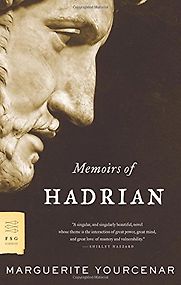Memoirs of Hadrian
by Marguerite Yourcenar, translated by Grace Frick
Marguerite Yourcenar’s twelfth book is considered a landmark in historical fiction. Yourcenar began researching Memoirs of Hadrian—the story of the Roman emperor’s life, told in the form of a letter to his adopted grandson, Marcus Aurelius—as a youth, but didn’t finish the book until she rediscovered her notes in an old chest in her forties. Yourcenar once recalled the writing of Memoirs of Hadrian to have been so intense as to constitute a “controlled delirium”. Yourcenar utterly inhabited the mind of a far-off historical figure. As Joan Acocella once wrote in The New Yorker, “No other document takes us so deeply into the pre-Christian mind.”
Recommendations from our site
Like Wolf Hall, Marguerite Yourcenar’s twelfth book is considered a landmark in historical fiction. Yourcenar began researching Memoirs of Hadrian—the story of the Roman emperor’s life, told in the form of a letter to his adopted grandson, Marcus Aurelius—as a youth, but didn’t finish the book until she rediscovered her notes in an old chest in her forties (a story not so unlike the extended genesis of Mantel’s A Place of Greater Safety, first written in the 1970s but rewritten years later and finally published in 1992). Yourcenar once recalled the writing of Memoirs of Hadrian to have been so intense as to constitute a “controlled delirium”. As Mantel managed with Thomas Cromwell, Yourcenar utterly inhabited the mind of a far-off historical figure. Indeed, a further-off figure; Joan Acocella once wrote in The New Yorker, “No other document takes us so deeply into the pre-Christian mind.”
So if you enjoyed that sense of literary time-travel, of seeing the world through another person’s eyes and assuming their sensibilities, this is a great next step for you. Take a trip to the second century, AD.
From our article Books like Wolf Hall







